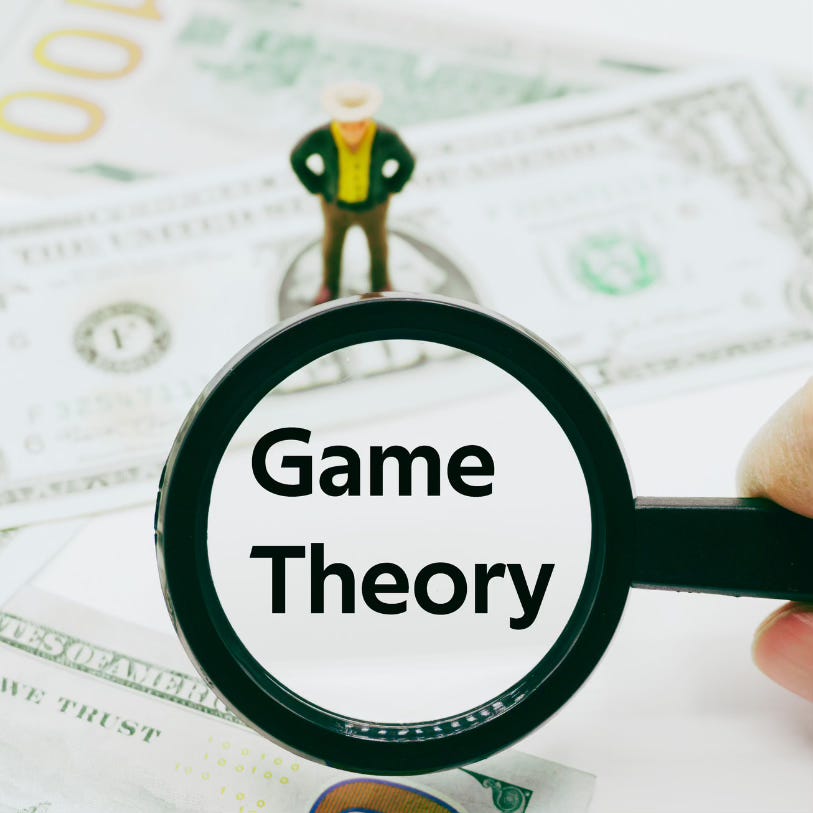Better Be Patient
by Anna Atsu
All my maths gurus were either insane or dead. There was a whole society of numerical geniuses, who received a one-way ticket to eccentricity. Check them out at the bottom of this article. On a more contemporary note, those I currently follow on Instagram are thankfully normal, alive, yet retired.
Mathematicians labelled as "insane" or eccentric, like the famed John Nash, have left an indelible mark on their field. Their unconventional thinking pushed the boundaries of mathematics, showcasing not only genius but a "beautiful mind." If you haven't already, take a detour to explore Nash's story through the film “Beautiful Mind” directed by Ron Howard based on a screenplay by Akiva Goldsman, who adapted the 1998 biography by Sylvia Nasar. It's a compelling narrative that might draw your focus away from continuing with this text.

Since you have not stopped to read to watch the film instead, one more time or for the first time, here is my favourite quote from it:
Nash: “I've made the most important discovery of my life. It's only in the mysterious equation of love that any logic or reasons can be found.”
Now, to the present discovery game – where real-life mathematicians, thankfully still breathing, and I find ourselves at a negotiated halfway point. It's not precisely a middle ground; rather, it's a mathematical no-man's-land although it is not exactly a minefield or war field. We may not completely grasp each other's thought processes, but we share glances, discuss the practicalities of life, and attempt to acknowledge the struggles and beauty inherent in each of us.
Amid existential crises regarding the nature of zero, my viewpoint on this elusive concept aligns with my previous article, "One Day, One Deed in One’s Life." I, driven by the desire to add value, tend to round up, while the mathematical mind argues that inept effort is worth 'zero,' sometimes rounding down to the same. In this camaraderie, the beauty lies not in synchronisation but in affording enough room for our differences – a strange meeting of the limits of logic and the chaos of creativity.
In such a setting, patience should be a survival skill. Keeping up with one another demands perseverance, fuelled by mathematically measured amounts of caffeine and a hearty sense of humour:
Nash: The beauty of mathematics only shows itself to more patient followers.
Today, after the beautiful and insane introduction, let me brush up on history and take you to my early encounters with numbers and words:
As a child, I quickly learned the significance of the 'first impression,' a fundamental teaching that extended to preparing people for work interviews. However, my introduction to numbers was far from favourable, courtesy of impatient teachers. I followed them respectfully and fearfully, creating an initial disconnect between me and the world of numbers.
A child subjected to the fear of judgment and criticism from teachers and peers may not develop a love for numbers. Stress, in measured amounts, plays a role in learning, yet too much or at the wrong time may hinder the process.
The mental math competitions did not favour me. I take my time to find peace in finding unique solutions to problems and not following the usual rules so I find the ‘genius’ questions of IQ tests child’s play. While I comprehend the rules and equations governing lengthy mathematical word problems, my childish, inherited impatience usually leads me to consistently imprecise answers.
Diverting from the practice maths sessions that lacked calmness in the teacher’s voice, I dedicated the remaining lesson time to writing poetry. Despite all my grades being consistently high, maths remained the outlier, the only subject that did not conform. However, a stroke of luck came in our final year – an educational reform removed the mandatory need to pass maths, replacing it with another subject. History turned out to be the perfect substitute.
“We must beware of yielding to the pressure of a spirit of cowardly conformity which proclaims itself everybody's friend in the hope that everybody will obligingly return the compliment.”
Antonin Sertillanges
Words, old and historical or modern and newly-made in contrast to numbers, always resonated with me. I pursued linguistics at a university that, despite its aged appearance, held a charm of its own. Across the street stood the University of Economics, a modern edifice filled with students adorned in smart attire and driving luxurious cars. The initial impact of numbers was so profound that I preferred to analyse grammatical structures and lexicology, sitting on a wall in a stretched sweater, rather than understanding where the economical universe of reason spins with its affluent students.
“But human beings are not machines, and however powerful the pressure to conform, they sometimes are so moved by what they see as injustice that they dare to declare their independence. In that historical possibility lies hope.”
Howard Zinn
Despite my prolonged aversion to numbers induced by impatient mathematicians, years later, I found myself back at another university of economics in a different city. This time, my pursuit was not cantered around numbers; it was an exploration of intercultural differences through the study of international trade. My journey always took the roundabout road, eschewing the direct path.
Shouting, as I learned, doesn't calculate. To prove oneself as a great mathematician, the key lies in finding solutions, trusting the process, and maintaining patience while navigating through the complexities of a given question, task, or issue. I commit to patiently following the process while still thinking outside the box.
So since we are in a season of dark colours, here's a tribute to the insane, the departed, and the retired mathematicians whom I admire as a mere mortal. "Better be patient," they say. Patience is the secret code to unlocking everything.
Soft words have always spoken to me, and now, I realize, so does math. The only requirement is a teacher with the patience to guide the way.
You’ve got the key,
be patient with me.
Patience weaves
a dance that believes.
You've got the key,
and I need it much.
As seasons change,
let's turn the page.
Through tears we share,
handle me with care.
Let blooms unfold,
let our story be told.
A winding road,
let our connection be bold.
With each gentle moment,
a chapter anew,
Be patient with me,
and love will accrue.
Read some new and old books on maths genius and well-calculated improvement:
Math Markers: The Lives and Works of 50 Famous Mathematicians
Men Are from Mars, Women Are from Venus: A Practical Guide for Improving
Communication and Getting What You Want in Your Relationship
Watch older films and series on beautiful minds:
https://en.wikipedia.org/wiki/Genius_(American_TV_series)
Explore new research on learning and stress:
And the final brainy list of departed Mathematicians:
1. Georg Cantor (1845–1918): Known for his ground-breaking work in set theory, Cantor's ideas on infinity and his development of the theory of transfinite numbers were considered quite eccentric during his time. His struggles with mental health, including bouts of depression and paranoia, added a touch of madness to his brilliant mathematical contributions.
2. Kurt Gödel (1906–1978): Famous for his incompleteness theorems, Gödel's work revolutionized the foundations of mathematics. However, he grappled with severe mental health issues, including obsessive-compulsive disorder and paranoia. His fear of being poisoned led him to maintain a strict diet that ultimately contributed to his declining health.
3. John Nash (1928–2015): Nobel laureate in economics and a pioneer in game theory, Nash's life was portrayed in the film "A Beautiful Mind." He struggled with paranoid schizophrenia, a condition that manifested during his most productive years. Despite his mental health challenges, Nash made significant contributions to mathematics and economics.
4. Évariste Galois (1811–1832): A French mathematician who made foundational contributions to group theory, Galois was known for his rebellious and impulsive nature. He engaged in duels and died at a young age in mysterious circumstances, adding an element of tragic insanity to his legacy.
5. Niels Henrik Abel (1802–1829): The Norwegian mathematician Abel made groundbreaking contributions to the field of algebra. Despite his mathematical brilliance, Abel struggled with poverty and health issues throughout his life, contributing to a sense of melancholy and despair that surrounded him.
6. Paul Erdős (1913–1996): While not clinically insane, Erdős was certainly an eccentric character in the world of mathematics. He was known for his nomadic lifestyle, living out of a suitcase and collaborating with hundreds of mathematicians. His prolific output and devotion to mathematics sometimes bordered on obsession.
7. Alexander Grothendieck (1928–2014): A highly influential mathematician in the 20th century, Grothendieck was a key figure in the development of algebraic geometry. However, he became increasingly reclusive and eventually withdrew from the mathematical community. His eccentricities and withdrawal from public life added an air of mystery to his legacy.








